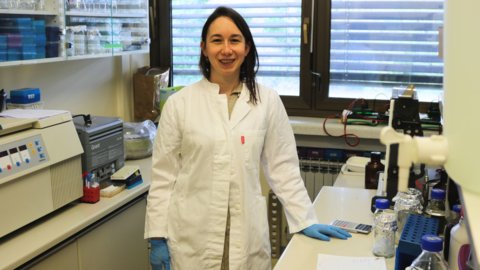When Monika Mlinarić first set foot in a laboratory at the Medical University of Vienna as a student, she had no idea that experience would shape the course of her scientific career. It was a short research placement, but among microscopes, test tubes, and the quiet focus of researchers at work, she realised she’d found her calling.
“I became fascinated by how cells function—and what happens when something goes wrong,” Monika recalls.
Today, Monika is based at the Ruđer Bošković Institute’s Laboratory for Membrane Transport and Signalling, where she’s investigating questions that could one day help improve breast cancer treatment. Her approach? She’s "listening" to how cells "breathe" under stress. For her doctoral research, she was awarded the 2024 Annual Award for Young Scientists and Artists by the Croatian Society of Young Researchers.
Tiny Channels, Big Consequences
Picture each cell in the body as a tiny, bustling city—with infrastructure, traffic, energy supply, and yes, even plumbing. In this miniature world, aquaporins are like microscopic pipes that allow water and certain molecules to flow in and out of cells.
Although unfamiliar to many, aquaporins are vital for keeping our bodies ticking. But Monika and her team wanted to know: what happens to these molecular water channels when cells are under stress, especially cancer cells?
Under Pressure: How Cancer Cells Behave When Stressed
As part of her PhD research, Monika studied how healthy and cancerous breast cells respond to oxidative stress—akin to prolonged exposure to air pollution or unprotected sunbathing. She discovered that even mild stress triggers changes in aquaporin behaviour—but only in the cancer cells. The healthy cells, by contrast, remained steady and unphased.
In short, cancer cells seem to respond differently under pressure—and that could be their Achilles’ heel.
Hydrogen Peroxide: A Cell’s Quiet Ally
Her team paid special attention to a subset of aquaporins known as peroxiporins, which transport hydrogen peroxide – a molecule best known for disinfecting wounds, but which also naturally occurs in our bodies as a cellular signalling tool. In small doses, it’s helpful. But if it builds up, it can wreak havoc, fuelling disease and even tumour growth.
Monika’s findings open the door to exciting new research: if tumour cells adapt their use of aquaporins under stress, this behaviour could be exploited in future cancer treatments. In other words - if we understand how cancer cells breathe, perhaps we can take their oxygen away.
From Vienna to Lisbon and London - Knowledge Knows No Borders
Monika began her academic journey at the University of Zagreb’s Faculty of Science and pursued her PhD in Molecular Biosciences in Osijek. Along the way, she honed her skills in Lisbon and London, learning the latest techniques in cell biology. Today, she’s working to bring those same cutting-edge methods to her lab at the Ruđer Bošković Institute, including real-time monitoring of aquaporin activity.
“Our goal isn’t just to count how many there are, but to understand exactly what they’re doing under certain conditions. That’s when we truly grasp their biological role,” she explains.
Recognition as Motivation
Monika’s work recently earned her the 2024 Annual Award for Young Scientists and Artists – an honour she says provides fresh motivation for the challenges ahead. While days in the lab can be long and breakthroughs don’t come overnight, she believes the effort is well worth it.
“Science isn’t a sprint, it’s a marathon. But knowing your research could help others? That’s priceless.”
Her Message to the Next Generation: “Curiosity is Your Superpower”
Working at the Ruđer Bošković Institute, Monika says, means being part of a supportive environment that encourages growth, learning, and collaboration. Science isn’t always easy, but it’s deeply rewarding to know your work contributes to something greater than yourself.
She hasn’t forgotten her own beginnings, full of questions, curiosity, and uncertainty. To young people considering a future in science, she offers this advice:
“Science can be challenging, but it brings huge satisfaction, especially when you realise your research adds a piece to the puzzle of understanding the world. My advice? Stay curious, stay resilient, and never lose sight of your goals.”
Big Stories Can Hide in Small Molecules
Monika’s work, and that of her colleagues at the Laboratory for Membrane Transport and Signalling, shows just how much impact even the tiniest molecules can have. Sometimes, it’s the invisible things that matter most. And with dedicated scientists listening closely, those small details might one day help us win the battle against cancer.
After all, who’s to say the next great discovery won’t come from a curious student, still in secondary school today, ready to take their first steps towards solving tomorrow’s biggest challenges?






